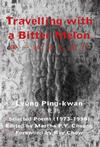帶一枚苦瓜去旅行 Travelling with a bitter melon
出版时间:2002 作者:梁秉鈞,Leung Ping-Kwan 译者:Martha Cheung, et al.
Tag标签:无
内容概要
"It is fitting that Travelling With A Bitter Melon, the most comprehensive collection of Leung Ping-kwan's poetry, should come at a tim e when Hong Kong is experiencing an upsurge of interest in home-grown writing. Fitting, because this bilingual volume will serve to remind those striving to forge Hong Kong's English-language voice that the city's most gifted poet has been writing and publishing in Chinese for more than a quarter of a century, and has built up an invaluable body of work over that time. This book is a must for anyone who takes Hong Kong writing seriously.
"The complicated subject of Hong Kong identity dominates. Leung focuses deliberately on the ordinary: a teacup, a tree, a deserted tram depot, a bitter melon. They are our shared images and they are treated tenderly.
"A thread of disciplined intelligence runs through Leung's work, lending these mundane images a singular power. The first poem in the volume, 'Tea,' reveals the poet's trademark preoccupation with food as a metaphor. In this poem, 'Jasmine petals gather/or disperse in patterns', a reminder of dear friends: 'Kept apart by so many trivialities/we have no moment of silence/to sit and sip together'.
"The lines are redolent of classical Chinese poetry, a key interest ?Leung is professor of Chinese at Lingnan University in Tuen Mun.
"Leung's language is crisp, searching and unsentimental without simplifying his subject matter. In 'Fragments Of A Northern Song Dynasty Fish-shaped Pot,' the poet wonders from where in China it came, and concludes: 'The fragments say: Please carefully study our grain/Don't read us into/Your history.' Hong Kong is on the periphery, offering alternative solutions to what it means to be Chinese in the modern world.
"Later, in 'Images Of Hong Kong,' the narrator searches for a postcard to send a friend. Yet he finds mostly 'Exotica for a faraway audience...Entangled with what others have said/Why is it so hard to tell our own stories?'
"The poems offer a chronological journey froth the relative stability of the 1970s through the growing insecurities of the 1980s as the Joint Declaration on Hong Kong's future was signed.
"This collection also shows Leung's proclivity for food as a metaphor of cultural identity, something pointed out in Rey Chow's excellent introductory essay.
"In 'Mussels In Brussels,' the poet muses: 'All say mussels have no identity problems/Perhaps...after all, here in Brussels/we still eat Canadian mussels'. Yet the poem's final conclusion argues for a sense of origin: 'Chinese mussels strayed from home/thousands of miles away, still taste of/the ponds and lakes that bred them.'
"There is a cinematic quality to much of Leung's work, which one of his translators, Gordon Osing, has attributed to the elisions in the lines. This isn't a coincidence ?Leung is interested in film, and film is the art form that has done the most to articulate the modern Hong Kong sensibility and win it an international audience. The films of John Woo or Wong Kar-wai are examples of this.
"If poetry is an overlooked art these days, then Hong Kong poetry falls into a doubly ignored category, being poetry from a city in which few people are interested in the written word.
"Yet readers will find a vividness and veracity of historical, cultural and emotional detail which, rooted in the Hong Kong experience, should put to rest any doubts about the city's place as a literary hub."
Didi Kirsten Tatlow
South China Morning Post
图书封面
图书标签Tags
无
评论、评分、阅读与下载
帶一枚苦瓜去旅行 Travelling with a bitter melon PDF格式下载
